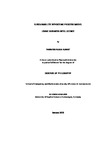Sustainability Reporting Process Model using Business Intelligence
| dc.contributor.supervisor | Knahl, Martin Dr. | |
| dc.contributor.author | Alxneit, Thorsten Julius | |
| dc.contributor.other | School of Engineering, Computing and Mathematics | en_US |
| dc.date.accessioned | 2015-02-19T09:49:16Z | |
| dc.date.available | 2015-02-19T09:49:16Z | |
| dc.date.issued | 2015 | |
| dc.identifier | thorsten.alxneit@plymouth.ac.uk | en_US |
| dc.identifier.uri | http://hdl.handle.net/10026.1/3255 | |
| dc.description.abstract |
Sustainability including the reporting requirements is one of the most relevant topics for companies. In recent years, many software providers have launched new software tools targeting companies committed to implementing sustainability reporting. But it’s not only companies willing to use their Business Intelligence (BI) solution, there are also basic principles such as the single source of truth and tendencies to combine sustainability reporting with the financial reporting (Integrated Reporting) The IT integration of sustainability reporting has received limited attention by scientific research and can be facilitated using BI systems. This has to be done both to anticipate the economic demand for integrated reporting from an IT perspective as well as for ensuring the reporting of revisable data. Through the adaption of BI systems, necessary environmental and social changes can be addressed rather than merely displaying sustainability data from additional, detached systems or generic spreadsheet applications. This thesis presents research in the two domains sustainability reporting and Business Intelligence and provides a method to support companies willing to implement sustainability reporting with BI. SureBI presented within this thesis is developed to address experts from both sustainability and BI. At first BI is researched from a IT and project perspective and a novel BI reporting process is developed. Then, sustainability reporting is researched focusing on the reporting content and a sustainability reporting process is derived. Based on these two reporting processes SureBI is developed, a step-by-step process method, aiming to guide companies through the process of implementing sustainability reporting using their BI environment. Concluding, an evaluation and implementation assesses the suitability and correctness of the process model and exemplarily implements crucial IT tasks of the process. The novel combination of these two topics indicates challenges from both fields. In case of BI, users face problems regarding historically grown systems and lacking implementation strategies. In case of sustainability, the mostly voluntary manner of this reporting leads to an uncertainty as to which indicators have to be reported. The resulting SureBI addresses and highlights these challenges and provides methods for the addressing and prioritization of new stakeholders, the prioritization of the reporting content and describes possibilities to integrate the high amount of estimation figures using BI. Results prove that sustainability reporting could and should be implemented using existing BI solutions. | en_US |
| dc.language.iso | en | en_US |
| dc.publisher | Plymouth University | en_US |
| dc.subject | Sustainability Reporting | en_US |
| dc.subject | CSR Reporting | en_US |
| dc.subject | Business Intelligence | en_US |
| dc.subject | Implementation Process | en_US |
| dc.subject | Process Model | en_US |
| dc.title | Sustainability Reporting Process Model using Business Intelligence | en_US |
| dc.type | Thesis | |
| plymouth.version | Full version | en_US |
| dc.identifier.doi | http://dx.doi.org/10.24382/4828 |
Files in this item
This item appears in the following Collection(s)
-
01 Research Theses Main Collection
Research Theses Main


